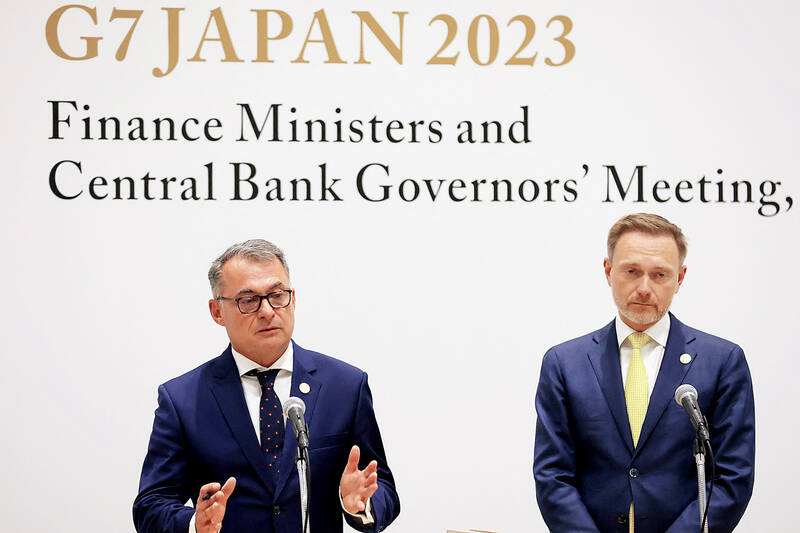Finance ministers from the world’s rich economies could propose a new partnership on supply chains that would be open to other nations, and would require countries to have minimum standards on human rights and environmental policies to join.
Officials are well advanced in drafting a statement for the G7 meeting, with the additional details on diversifying supply chains to be included, people familiar with the matter said.
The planned partnership would start by the end of this year, they said, declining to be named as the drafting is not public.

Photo: REUTERS
Efforts to diversify the supply chain of renewable energy resources is also likely, one person said. China has a dominant position in the supply of some rare earths, and policymakers from around the world have spoken about the need to diversify sources.
Finance ministers and central bank chiefs from the G7 yesterday began a second day of talks in Niigata, Japan, with three hours of closed-door morning talks on global financial stability.
Shoring up supply chains is among the top concerns at the G7 gathering, alongside concerns over the financial sector, the war in Ukraine and debt restructuring.
The G7 finance officers would be looking to show more progress on these issues than is possible in the more disparate G20, which includes China and Russia.
The strengthening of supply chains inevitably has a geopolitical element, given China’s importance in supplying and manufacturing for the global economy. While the US is pushing to reduce reliance on China, some European countries are showing some reluctance.
Speaking in Niigata, European Commissioner for Economy Paolo Gentiloni said that a decoupling from China presents a risk for global commerce.
“What we are talking about is not closing our trade with China, but making our supply chains more secure in some strategic sectors like rare minerals,” Gentiloni said in an interview on the sidelines of the summit. “I think you have to build your own capacity in some of these sectors. This is absolutely needed.”
Yesterday’s talks were to continue through the afternoon, and were to be followed by a dinner. Meetings would resume this morning, with a concluding statement and news conference scheduled for about 12:30pm.
Japan, as this year’s G7 host, invited officials from emerging economies including Brazil and Indonesia to the gathering.
That is a departure from protocol, with the aim to counter China’s growing influence in the so-called Global South.
With recent G20 meetings marred by discord over Russia’s invasion of Ukraine, the G7 has allowed the US and allies to push priorities such as tightening sanctions on Russia and diversifying supply chains from China.
US Secretary of the Treasury Janet Yellen on Thursday said that Washington intends to crack down on Russia’s ability to skirt sanctions imposed by the US and allies after its invasion of Ukraine.
She said she hopes to discuss with her G7 counterparts a set of possible restrictions on outbound investments to China that US President Joe Biden’s administration has been mulling for some time, but has not yet finalized.

Anna Bhobho, a 31-year-old housewife from rural Zimbabwe, was once a silent observer in her home, excluded from financial and family decisionmaking in the deeply patriarchal society. Today, she is a driver of change in her village, thanks to an electric tricycle she owns. In many parts of rural sub-Saharan Africa, women have long been excluded from mainstream economic activities such as operating public transportation. However, three-wheelers powered by green energy are reversing that trend, offering financial opportunities and a newfound sense of importance. “My husband now looks up to me to take care of a large chunk of expenses,

SECTOR LEADER: TSMC can increase capacity by as much as 20 percent or more in the advanced node part of the foundry market by 2030, an analyst said Taiwan Semiconductor Manufacturing Co (TSMC, 台積電) is expected to lead its peers in the advanced 2-nanometer process technology, despite competition from Samsung Electronics Co and Intel Corp, TrendForce Corp analyst Joanne Chiao (喬安) said. TSMC’s sophisticated products and its large production scale are expected to allow the company to continue dominating the global 2-nanometer process market this year, Chiao said. The world’s largest contract chipmaker is scheduled to begin mass production of chips made on the 2-nanometer process in its Hsinchu fab in the second half of this year. It would also hold a ceremony on Monday next week to

TECH CLUSTER: The US company’s new office is in the Shalun Smart Green Energy Science City, a new AI industry base and cybersecurity hub in southern Taiwan US chip designer Advanced Micro Devices Inc (AMD) yesterday launched an office in Tainan’s Gueiren District (歸仁), marking a significant milestone in the development of southern Taiwan’s artificial intelligence (AI) industry, the Tainan City Government said in a statement. AMD Taiwan general manager Vincent Chern (陳民皓) presided over the opening ceremony for the company’s new office at the Shalun Smart Green Energy Science City (沙崙智慧綠能科學城), a new AI industry base and cybersecurity hub in southern Taiwan. Facilities in the new office include an information processing center, and a research and development (R&D) center, the Tainan Economic Development Bureau said. The Ministry

ADVERSARIES: The new list includes 11 entities in China and one in Taiwan, which is a local branch of Chinese cloud computing firm Inspur Group The US added dozens of entities to a trade blacklist on Tuesday, the US Department of Commerce said, in part to disrupt Beijing’s artificial intelligence (AI) and advanced computing capabilities. The action affects 80 entities from countries including China, the United Arab Emirates and Iran, with the commerce department citing their “activities contrary to US national security and foreign policy.” Those added to the “entity list” are restricted from obtaining US items and technologies without government authorization. “We will not allow adversaries to exploit American technology to bolster their own militaries and threaten American lives,” US Secretary of Commerce Howard Lutnick said. The entities